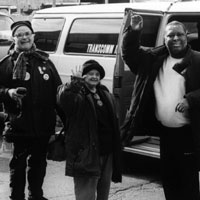I don't know what to expect, having decided to spend a week at the
Walnut Street Center, a workshop for the mentally handicapped. I want
to photograph and record the work done by the job coaches and the men
and women served by the Center. I want to discover who these people are
and what they are capable of accomplishing.
 I also want to find out more about the staff at the center, and why they
chose to work here with the mentally handicapped.
I also want to find out more about the staff at the center, and why they
chose to work here with the mentally handicapped.
My week begins with Bruce, the director of the Walnut Street Center,
explaining that the center's funding comes from the Massachusetts
Department of Mental Retardation (DMR). Through various job centers and
other programs, the DMR assists over 30,000 mentally disabled
individuals in Massachusetts. At the Walnut Street Center, individuals
are coached and mentored by the staff of job coaches to work
productively, and to socialize with each other. Individuals have
opportunities to work at sites outside of the center as well. The
eventual goal is to have the individuals working in the community,
without job coaches, integrated into society. "Without centers like
this," Bruce explains, "mentally handicapped children eventually age out
of state funded schools, and live at home with their parents, without
opportunities to work or interact with others". He pauses and looks out
the window of his office. "And that isn't right", he adds.
 Seventy individuals are employed by the center, and are assisted by
seven job coaches. Job coaches work with the individuals both at the
Center and at other locations. Work at the center consists mainly of
envelope stuffing for clients such as political campaigns, non-profit
organizations and charities. Envelope stuffing is broken down into
smaller tasks, like folding, counting, collating, mailing list matching,
envelope labeling, letter inserting and envelope sealing.
Seventy individuals are employed by the center, and are assisted by
seven job coaches. Job coaches work with the individuals both at the
Center and at other locations. Work at the center consists mainly of
envelope stuffing for clients such as political campaigns, non-profit
organizations and charities. Envelope stuffing is broken down into
smaller tasks, like folding, counting, collating, mailing list matching,
envelope labeling, letter inserting and envelope sealing.
 The job coaches arrive at the center long before the individuals arrive, meeting
in the morning to decide what jobs can be assigned to which individuals.
Individuals are paid for each batch of work that they complete; some are
able to keep their own tally, others require the help of the job
coaches.
The job coaches arrive at the center long before the individuals arrive, meeting
in the morning to decide what jobs can be assigned to which individuals.
Individuals are paid for each batch of work that they complete; some are
able to keep their own tally, others require the help of the job
coaches.
The first of the individuals arrive, and I try not to stare. They range
in age from 25 to 75. All have some mix of learning disabilities,
physical disabilities, mental retardation and mental illness. The ones
afflicted with Down Syndrome have the typical stockiness and
facial characteristics. Others appear "normal". People come in,
talk with each other - and themselves - and sit down at their desks.
Someone comes up to me and shakes my hand. She introduces herself as
Maria, and asks if I'm new here. I explain that I'm here to watch them
work. The center consists of a large open room, where people share
desks and table space. The work is familiar to most of the individuals;
they seem to be able to work on their own. Helen and Jan, two of the
job coaches, walk up and down the aisles distributing work and
collecting finished batches. They also update tally sheets to record
who completed what batch of work.
 Some individuals have job assignments outside of the center. On
Tuesday, I follow Maureen, one of the job coaches, as she takes Cheryl,
Pat, Connie and Cledwyn to Tufts University, where the center has
arranged for them to water plants on campus. When we arrive at the
Tufts campus, they immediately disperse to do their jobs. The
highlight of this outing is lunch at the mall. "Watering the plants is
an excuse to go out to lunch", Maureen explains to me as we enter the
food court. I stand behind Connie in line at McDonalds. Connie is
barely tall enough to be seen over the counter. Typically, people with
Down Syndrome rarely reach adult height, and rarely do they develop
beyond the mental ability of an eight-year-old. Nevertheless, I watch
as she orders her lunch and pays for it herself.
Some individuals have job assignments outside of the center. On
Tuesday, I follow Maureen, one of the job coaches, as she takes Cheryl,
Pat, Connie and Cledwyn to Tufts University, where the center has
arranged for them to water plants on campus. When we arrive at the
Tufts campus, they immediately disperse to do their jobs. The
highlight of this outing is lunch at the mall. "Watering the plants is
an excuse to go out to lunch", Maureen explains to me as we enter the
food court. I stand behind Connie in line at McDonalds. Connie is
barely tall enough to be seen over the counter. Typically, people with
Down Syndrome rarely reach adult height, and rarely do they develop
beyond the mental ability of an eight-year-old. Nevertheless, I watch
as she orders her lunch and pays for it herself.
 During lunch, I chat with Maureen. I find out that she's been working
at the center for over 10 years. When I comment that 10 years is a long time,
she replies that it gets to be a habit. She quickly corrects herself
that maybe habit isn't quite the right word. Our group is a-whirl with
chatter and motion. Pat gets up to go to a nearby pet store to look at parakeets. I find
out from Cheryl that she and Connie have known each other from school. Connie confides in me that she has a friend
also named Tom. "I met him in Chelsea" she explains. Pat returns from
the pet store, and describes the parakeets. She recounts how
she used to own a parakeet long ago. All this while, Maureen has been
sitting opposite me, silent. "We should get going", she announces. She needs
to get the van back to the center. There's another group going to a church in
Cambridge to help fold pamphlets and mop floors.
During lunch, I chat with Maureen. I find out that she's been working
at the center for over 10 years. When I comment that 10 years is a long time,
she replies that it gets to be a habit. She quickly corrects herself
that maybe habit isn't quite the right word. Our group is a-whirl with
chatter and motion. Pat gets up to go to a nearby pet store to look at parakeets. I find
out from Cheryl that she and Connie have known each other from school. Connie confides in me that she has a friend
also named Tom. "I met him in Chelsea" she explains. Pat returns from
the pet store, and describes the parakeets. She recounts how
she used to own a parakeet long ago. All this while, Maureen has been
sitting opposite me, silent. "We should get going", she announces. She needs
to get the van back to the center. There's another group going to a church in
Cambridge to help fold pamphlets and mop floors.
As we get up to leave the food court, an old man from a nearby table
beckons me over. He leans to me and says that he's glad that I do what
I do. "That has got to be the toughest job in the world. You can't pay
me enough to do what you do", he says. I don't tell him that this isn't
what I do, that he should be addressing Maureen. A week ago I would have agreed with him. Today, I'm not so sure.
Not knowing how to respond, I nod and catch up to the group.
Back at the center, work continues. Kathy, one of the individuals,
enthusiastically insists on showing me the C fold, one of two ways a
letter can be folded.
 "Tom, pay attention, pay attention", she chides me when I look down to
adjust my camera. "Are you looking, Tom? You take the bottom of the
sheet and bring it up to the line 'in the year 2001'". Kathy's job
coach taught her to fold this batch of letters to this particular
sentence, one third of the way down from the top of the sheet. "Then
you fold the top down over it. Did you see that Tom? Do you know how
it's done, Tom?" I quickly nod, less so to reassure her that I
understand, more so that she will continue to work and not be distracted
by me. She continues to narrate, nonetheless, as I watch her work. Some
individuals can finish 1,000 pieces of mail a day. A stack of neatly
folded letters grows on the desk before her.
"Tom, pay attention, pay attention", she chides me when I look down to
adjust my camera. "Are you looking, Tom? You take the bottom of the
sheet and bring it up to the line 'in the year 2001'". Kathy's job
coach taught her to fold this batch of letters to this particular
sentence, one third of the way down from the top of the sheet. "Then
you fold the top down over it. Did you see that Tom? Do you know how
it's done, Tom?" I quickly nod, less so to reassure her that I
understand, more so that she will continue to work and not be distracted
by me. She continues to narrate, nonetheless, as I watch her work. Some
individuals can finish 1,000 pieces of mail a day. A stack of neatly
folded letters grows on the desk before her.
Another job placement that the center has arranged is for Cindy to work
part time as a phone receptionist at the Massachusetts DMR. Cindy's job
is to assist with filing and data entry, and to answer phones. She
usually transfers calls to the appropriate office.
 Today, Maureen is trying to train Cindy to keep cool during a hostile
call. Cindy has in the past reacted inappropriately to irate callers,
so Maureen practices calls with Cindy. As I watch Maureen coach Cindy
through the calls, I think back to what that man said to me at the mall.
Why are people so uncomfortable with the mentally handicapped? What are
we afraid of?
Today, Maureen is trying to train Cindy to keep cool during a hostile
call. Cindy has in the past reacted inappropriately to irate callers,
so Maureen practices calls with Cindy. As I watch Maureen coach Cindy
through the calls, I think back to what that man said to me at the mall.
Why are people so uncomfortable with the mentally handicapped? What are
we afraid of?
Bill and Dan have outside part-time job placements as well. Bill works
at Best Buy, and Dan works at Borders. Peggy works with Bill, while
Maureen coaches Dan. On Thursday, I follow Peggy through Best Buy into
their stock room.
 I see Bill, working with a bar code scanner, labeling new merchandise.
He looks up and seems surprised to see me. He proceeds to scan and
label videotapes. Bill needs some occasional coaching from Peggy about
how to label correctly. "Do you know Bill can't tell time?", Peggy tells
me. "I've tried to teach him, but he just can't do it." Bill works
mornings at Best Buy and afternoons at the workshop, so Peggy will have to tell Bill when
it is time to leave.
I see Bill, working with a bar code scanner, labeling new merchandise.
He looks up and seems surprised to see me. He proceeds to scan and
label videotapes. Bill needs some occasional coaching from Peggy about
how to label correctly. "Do you know Bill can't tell time?", Peggy tells
me. "I've tried to teach him, but he just can't do it." Bill works
mornings at Best Buy and afternoons at the workshop, so Peggy will have to tell Bill when
it is time to leave.
I leave Best Buy to go to Borders to see Maureen and Dan. Dan is in the
stock room, preparing unsold magazines and newspapers for return to the
publishers while Maureen supervises. I ask Maureen about how she got
involved with the mentally handicapped. She tells me that she was a
psychology major in college and that her advisor had suggested that she
pursue this line of work because she was a "patient person".
I tell Maureen what had happened to me at lunch on Tuesday, about how
someone told me how they could never do this work. She shakes her head.
"I hear that a lot from people. I'm no saint. I mean, I'm a patient
person, and I'm glad I'm not disabled. But they're just people, just
like you and me. We're the same, and equal. Anyone can do this, you
just need to have patience, and empathy." We look over at Dan stacking
newspaper, ignoring us. "There's nothing tragic about them," she says
quietly. "People imagine a big difference between themselves and the
individuals. They're just like anyone else. Everyone has different
skills, skin color, and problems. People just don't want to look at
someone who's different. They want to shut them in the dark. We're not
above them. Education doesn't matter. A degree doesn't matter. It
doesn't put you above anyone else. We're on the same level."
Maureen pauses, and seems exhausted from her outpouring. "I can't see myself
working in a hospital, you know, with brain cancer patients", she says.
"But this, this is easy. It's like play time to me." She steps towards
Dan, and helps him sort newspapers. She has just summarized to me 10
years of emotions, loyalty, feelings developed while working with the
mentally handicapped, in 10 minutes. I continue to watch her work side
by side with Dan.
 After an afternoon spent observing Dan and Maureen, I start walking back
to the center. There is a bus that runs from the mall to the workshop,
but I don't wait for it. As I walk by the bus stop, I see Bill,
waiting for the bus. He's surprised to see me, but this time, there's more recognition.
I stop to chat, and to take the bus back with him. He shows me his
paycheck from Best Buy that he received today. He tells me he's going
to cash it and get his hair cut this weekend. The bus soon arrives and
I'm lost in thought as we ride back to the Center. I watch Bill sitting
across from me. On the one hand, here's someone who can't tell time,
and needs supervision for a fairly simple labeling task. Yet, here he
is, able to get around town on his own, blending in with everyone else
on the bus.
After an afternoon spent observing Dan and Maureen, I start walking back
to the center. There is a bus that runs from the mall to the workshop,
but I don't wait for it. As I walk by the bus stop, I see Bill,
waiting for the bus. He's surprised to see me, but this time, there's more recognition.
I stop to chat, and to take the bus back with him. He shows me his
paycheck from Best Buy that he received today. He tells me he's going
to cash it and get his hair cut this weekend. The bus soon arrives and
I'm lost in thought as we ride back to the Center. I watch Bill sitting
across from me. On the one hand, here's someone who can't tell time,
and needs supervision for a fairly simple labeling task. Yet, here he
is, able to get around town on his own, blending in with everyone else
on the bus.

Are we afraid when we look at someone who's mentally handicapped? Are
we scared of who they are, of their imperfections? Are we afraid of our
own frailties? Of our own weaknesses and shortcomings? Do we see our
own limitations, and dreams laid bare? Are we afraid that we may one
day fail to live up to somebody else's standards, and be rejected,
relegated, and shunned? Do we secretly hope that we will be supported,
and loved even for our failures, our own handicaps? A week at the
Walnut Street Center has shown me that handicapped people
ask only what we all want for ourselves, to be respected, accepted, and
loved.
Tom Louie
tom.louie@earthlink.net
May 15, 2002
|









